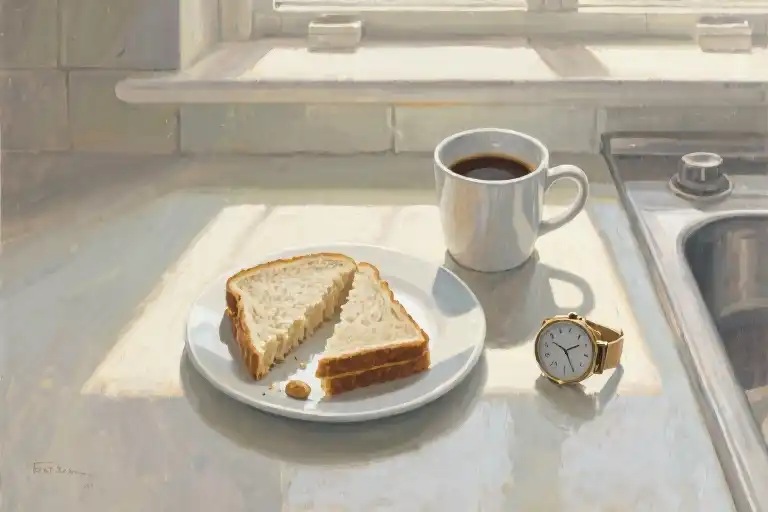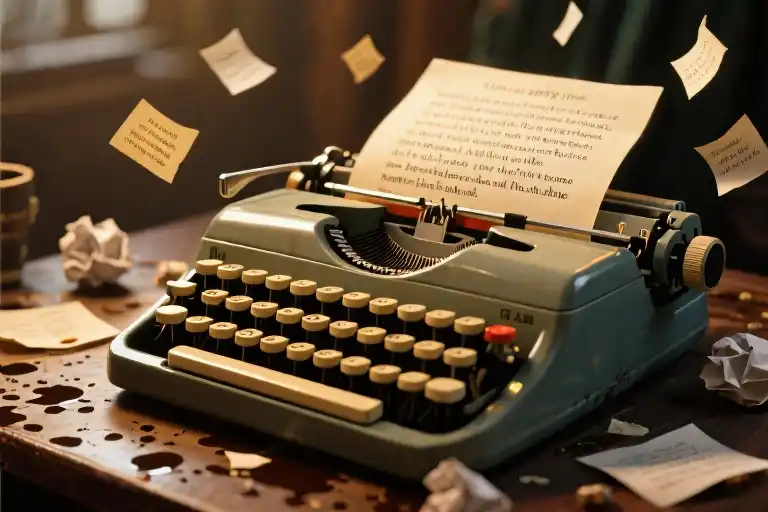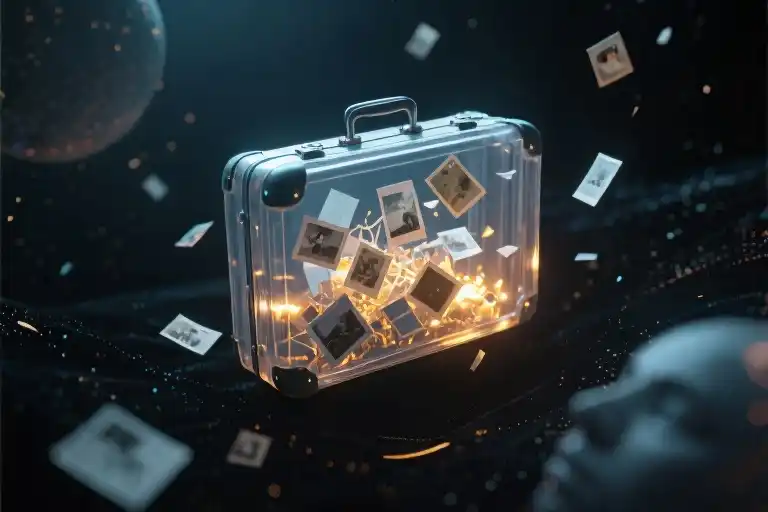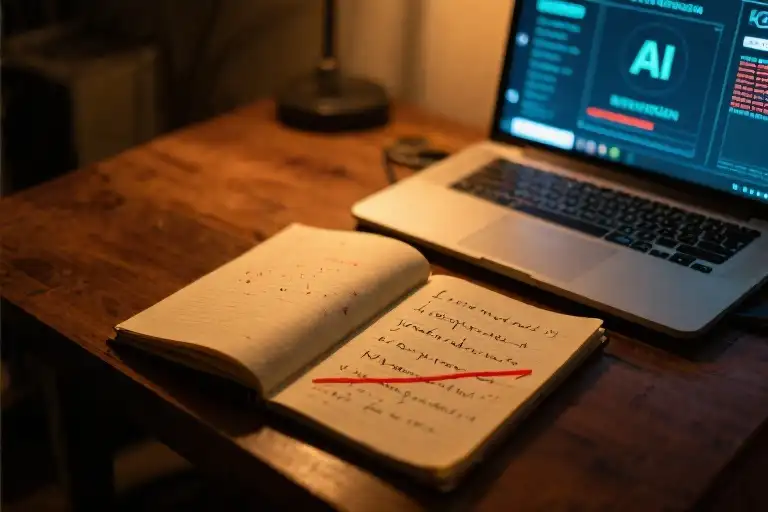The phone screen glows 6:30pm in that particular blue hue you once called “emergency-room fluorescent.” My thumb hovers over your contact photo — the one where you’re mid-laugh, peanut butter smeared at the corner of your mouth like some careless modern-art brushstroke. Five minutes pass. Not the ordinary kind that slip by while waiting for coffee, but the thick, syrupy sort that pools in your lungs until breathing becomes theoretical.
By 6:35pm, I’ve planned seven variations of your funeral. The third version features that navy suit you hated but looked devastating in, the one still hanging in our closet with dry-cleaning tags attached like some cruel promise. My fingers trace the rim of a plate where your sandwich used to be — crusts cut diagonally because you insisted right angles made the peanut butter “taste sad.” The Michelin-starred tasting menu I ate last Tuesday turned to ash in my mouth when I realized no amount of truffle shavings could replicate the warmth of your half-melted Skippy creations.
Grief writing begins in these microscopic fractures. That’s the cruel genius of loss — it hollows out grand canyons beneath your ribcage using nothing but mundane artifacts. A voicemail notification. The particular way afternoon light slants across an empty chair. The phantom weight of a head that no longer rests on your shoulder during movie nights. Literary healing isn’t about stitching these wounds shut, but learning to examine their edges with something resembling tenderness.
Your laughter still ambushes me sometimes — not the polite chuckle you reserved for dinner parties, but the full-bodied sound that used to shake the breakfast nook when we burned the toast. It arrives unannounced between subway stops, curling around my neck like the stray hairs you’d never quite tuck behind my ears. Trauma and creative writing share this quality: both deal in echoes. The way a single missed call can reverberate through months. How your favorite mug left unwashed becomes a museum exhibit of ordinary devastation.
I’ve started collecting these sensory details in grief writing like forensic evidence: the wool blanket you wrapped around your knees during chemo, now permanently dented to the shape of your shins. The half-empty bottle of rosemary oil you swore helped with neuropathy, its herbal scent now mingling with dust in the medicine cabinet. These become the vocabulary of absence, more precise than any clinical diagnosis. When psychologists talk about the five stages of loss, they never mention this sixth phase — the compulsive cataloging of mundane relics that suddenly hold entire civilizations of meaning.
That’s the paradox of emotional storytelling about lost loved ones. The objects remain stubbornly ordinary — a hairbrush clogged with auburn strands, a single stray sock behind the dryer — while simultaneously becoming sacred. You learn to measure time in new units: how many washes until your pillowcase loses its scent of herbal shampoo. The exact hour when the voicemail system finally reclaims your saved messages. The morning you realize you’ve stopped automatically reaching for two coffee mugs.
Perhaps this is how we survive profound loss — not through dramatic gestures, but by letting these microscopic griefs accumulate like sedimentary layers until they form something sturdy enough to stand upon. The peanut butter sandwich fossilized on its plate. The clock forever arrested at 6:35pm. The phantom vibration of a phone that will never again light up with your name. These become the foundation stones of a new geography, where every ordinary object holds the weight of continents.
The Collapse of Mundanity
The phone’s silence at 6:30pm wasn’t just an unanswered call—it was cardiac arrest in real time. My ribs became an echo chamber where each skipped beat ricocheted like a bullet you’d never meant to fire. Medical journals don’t prepare you for this variety of arrhythmia, the kind where time doesn’t just stop but actively unravels. In those five minutes of dead air, I diagnosed myself with a dozen new conditions: phantom limb syndrome for your voice, synesthesia that turned dial tones into funeral marches, an autoimmune response attacking all our shared memories.
On the kitchen counter, your abandoned peanut butter sandwich hardened into a fossil. I’d watched you make hundreds—crusts trimmed with surgical precision, grape jelly swirling like capillaries beneath translucent bread. Now the $300 tasting menu at Per Se turns to ash in my mouth while that stale, supermarket-brand sandwich remains the most alive thing in this apartment. Grief rewrites culinary hierarchies; what was once a rushed breakfast now carries more emotional nutrition than any Michelin-starred experience.
Your hands were always cold, even in July. I’d complain when you braided my hair after showers, your fingertips leaving goosebumps along my scalp. Now I’d give anything to feel that chill again—would sit perfectly still as you tangled my strands into lopsided pigtails, would trade every professional blowout for those amateur knots. The absence of your touch has become its own presence, a tactile ghost that lingers in every brush of wind against my neck.
This is how loss colonizes the everyday: not with grand gestures but through microscopic invasions. A digital clock blinking 6:31 becomes a war crime. A half-eaten sandwich transforms into a holy relic. The memory of cold fingers styling hair rewrites itself as sacred ritual. Trauma doesn’t announce itself with fanfare—it seeps into your life through these tiny cracks in routine, until one morning you realize all your normalcies have been quietly poisoned.
Sensory anchors in grief writing often hide in plain sight. The peanut butter sandwich—once just a lunchbox staple—now serves as both time capsule and torture device. 6:30pm has shed its numerical meaning to become a emotional landmine. These mundane details act as psychological tripwires, detonating memories when least expected. For those navigating loss, these triggers aren’t melodramatic flourishes but genuine neurological events—your amygdala registering danger where there’s only an empty chair, your hippocampus replaying scenes on a loop with no pause button.
When writing about emotional storytelling through daily objects, specificity is the scalpel that makes the incision bearable. Generic sadness floats; concrete grief anchors. That’s why the sandwich matters more than any abstract declaration of love—it’s a tactile witness to what was lost. The literary healing happens not in sweeping statements but through these hyperlocal details that bypass intellectual defenses to speak directly to the body’s memory.
Your absence has turned our apartment into a museum of ordinary artifacts suddenly priceless. I move through rooms like a conservator preserving exhibits: the indentation on your pillow, the toothpaste cap you never screwed on tight, the single gray hair still clinging to the shower wall. These are my relics now, more sacred than any religious icon. They say trauma fractures timelines, and I finally understand—my present has become an archaeological dig through layers of when you were here.
The Quantum State of Grief: When Anger and Longing Coexist
The seventh time you forgot to pick me up from school, I stood by the chain-link fence counting cracks in the pavement until my knees locked. That particular autumn afternoon, the schoolyard emptied in slow motion – first the squealing kindergarteners bundled into minivans, then the middle schoolers slouching toward the bus line, until only my shadow remained stretched long across the asphalt. I remember precisely 43 reasons I should have been furious, starting with the November chill seeping through my sweater sleeves and ending with the humiliation of watching Mrs. Henderson’s pitying smile as she offered me her office phone.
Yet when I finally trudged home (two miles in shoes meant for indoor courts), what caught in my throat wasn’t the sharp-edged ‘how could you’ I’d rehearsed, but the way your abandoned sweater lay crumpled on the hallway bench like a shed skin. By morning, it had migrated under my pillow, its sleeves twisted around mine in a facsimile of embrace. This is the alchemy of grief – how fury transmutes into relic worship, how the very things that wounded us become sacred artifacts.
Psychologists call this ‘ambivalent loss,’ but literature knows it better as love’s double helix – the way your phantom laughter still ambushes me during midnight dishwashing, both balm and blade. That sound, once so ordinary it barely registered between commercial breaks, now carries the visceral impact of a car crash. I’ll be scrubbing a plate when suddenly it’s there – your particular staccato chuckle that always peaked a half-octave too high – and the soap bubbles will shimmer with imagined champagne from that New Year’s Eve when you…
Memory has a cruel precision with such details. It preserves the exact timbre of your voice saying ‘I’ll be there at 3:15’ but erases the color of the raincoat you wore that last Tuesday. The mind becomes an archivist of absence, cataloging every unfulfilled promise like museum pieces: the unfinished sweater in your knitting basket, the half-read library book overdue since spring, the voicemail you left about trying that new Thai place ‘when things settle down.’
What no grief manual prepares you for is how loss amplifies life’s ordinary contradictions. That I can simultaneously resent the empty passenger seat yet compulsively adjust the mirror to your preferred angle. That I might curse your name while methodically organizing your spice jars by expiration date. The human heart doesn’t compartmentalize – it superimposes emotions like old film reels, creating impossible double exposures where anger and tenderness share the same frame.
This emotional quantum state manifests most vividly in sensory hallucinations. There’s the olfactory mirage of your bergamot shampoo wafting through the detergent aisle. The tactile ghost of your fingers fumbling with my braid whenever I lean back in the salon chair. These phantom sensations aren’t mere memory, but the nervous system’s rebellion against finality – as if by conjuring you vividly enough, my synapses could rewrite reality.
Perhaps this explains why bereavement feels less like linear progression than a Möbius strip of emotion. The same mind that replays your oversights with forensic intensity will also cling to your half-used lip balm like a holy relic. We don’t move through stages of grief so much as orbit them, our feelings existing in paradoxical superposition – loving and raging, holding on and letting go, all at once.
Creative writing about loss often stumbles into false binaries: either saccharine idealization or unrelenting bleakness. But true literary healing lives in the dissonance – in honoring how we can curse someone’s absence while treasuring their leftover toothpaste, how anger and longing aren’t sequential phases but simultaneous truths. The most powerful grief writing doesn’t tidy emotions into separate drawers; it lets them collide like charged particles, illuminating the strange beauty of love that persists beyond reason.
When the Clock Hands Shattered
The digital clock blinked 6:31pm with surgical precision, its neon numbers carving the first wound into what used to be our sacred hour. That one-minute overspill transformed the living room into a crime scene – your unopened messenger bubble the bloodstain, the silent landline the murder weapon. Einstein was wrong about relativity; your five-minute water break stretched longer than the five funerals my mind conducted in that span.
Time didn’t just stop when you disappeared – it fractured. The second hand now drags itself across the clockface like an amputee crawling through molasses. I mark days not by meetings or meals, but by counting 214 empty evenings where the door didn’t swing open at 6:30pm sharp, your laughter tumbling in ahead of you like an overeager golden retriever. The calendar hangs frozen in some parallel universe where you still circle Thursdays in red ink for our movie nights.
Grief rewrites physics. Your watch might measure those missing five minutes as 300 orderly seconds, but in my bones they’ve expanded into geological epochs. Enough time for civilizations to rise and fall between each unanswered ring, for entire species to evolve just to mourn you in ways I haven’t invented yet. The temporal whiplash leaves me seasick – one moment drowning in glacial slow-motion as I stare at your favorite mug, then suddenly catapulted through months that vanish like breath on a mirror.
Even clocks develop phantom limb syndrome. Every evening at 6:25pm, the antique grandfather clock in the hallway still tenses its pendulum like a dog perking its ears at the sound of a car engine. By 6:34pm, its chimes sound like bones rattling in a coffin. Sometimes I catch the microwave clock flashing 6:30pm for whole hours, stubborn as a child refusing to accept you’re not coming back this time.
They say time heals, but no one mentions how it first amputates. These days I wear your stopped wristwatch out of spite, its frozen hands mocking the world that keeps turning without you. Let the sun rise and set, let deadlines come and go – in this house we measure time by different metrics. By how long the scent lingers in your pillowcase. By how many times per hour I still check for texts you’ll never send. By how many midnights I’ve spent bargaining with a universe that took five ordinary minutes and made them infinite.
The Unfinished Mending
The scissors lie cold on the dresser where you last left them, their blades still holding the memory of your fingertips. I trace the outline now with my own hands, wondering if the metal remembers your touch better than I do. This is how grief writes itself into our days—not with grand gestures, but through these quiet, persistent absences that no amount of stitching can repair.
The Seamstress Who Couldn’t Mend
If thread could span the distance between this world and whatever comes after, I would have become the most diligent seamstress. I’d stitch with gold filament at dawn and silver wire by moonlight, patching every wound that ever dared to mark your skin. The irony isn’t lost on me—how I who could never sew a straight hem suddenly longed to master sutures fine enough to close the uncloseable.
Your old sewing kit sits untouched in the hallway drawer, its contents frozen in time:
- Spools of colored thread slowly fading
- Buttons from shirts you’ll never wear again
- That bent needle you always meant to replace
These became my relics, the physical evidence that you once moved through these rooms leaving ordinary messes in your wake. Now their very ordinariness aches like a fresh bruise.
The Braiding Ritual
Wednesday evenings were for hair braiding, though neither of us ever mastered the technique. You’d fumble through the motions, your cold fingers (always so cold) tangling the strands into lopsided plaits while I pretended not to notice the mistakes. Now I sit before the mirror deliberately recreating those imperfect patterns, letting the strands fall unevenly just to feel the ghost of your touch in the chaos.
Three things I’ve learned about loss:
- It lingers in the muscles before the mind accepts it
- The body remembers what the heart tries to forget
- Some wounds resist all stitching
The hairbrush still carries strands of your dark hair intertwined with mine—a physical manifestation of that messy, beautiful entanglement we called love. I could clean it, but I won’t. Let the evidence remain.
The Interrupted Sentence
The house settles into its evening rhythms, the way houses do when they become accustomed to absence. A curtain flutters where no window stands open. The clock ticks toward 6:30 but never quite arrives. And there, on the edge of perception—
Because that day you finally…
I leave the thought unfinished, like the braids you used to attempt, like the mending pile that still waits for attention, like every conversation we never got to finish. The shadows lengthen across the floor, stitching the daylight to darkness with invisible thread.





